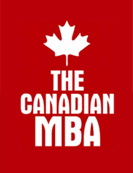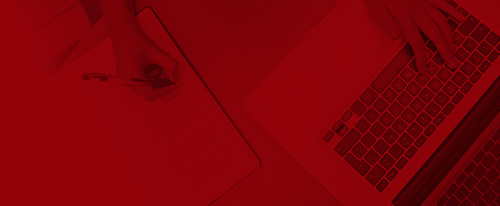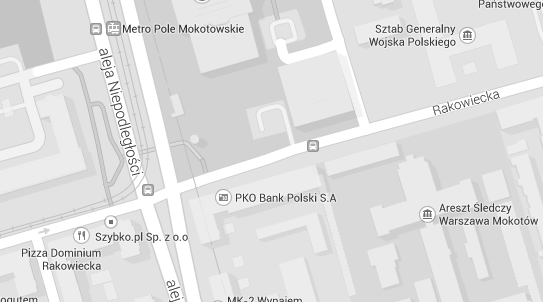04.10.2022 (Brand new) hybrid mode at CEMBA
The students of the first “pandemic” edition of the Canadian Executive MBA Programme will finish their last required courses in October 2022. The recruitment for this edition was the first one to be conducted fully online and the classes were held both online and in person. The recruitment for the next, 29th edition has already started.
The time of the pandemic has let us reflect on our program and carry out necessary changes that proved beneficial to our students. Some of the classes are held online, others are held in a hybrid mode including an online transmission from the class and in case of those courses where networking and integration play a major role, are only conducted in person.
Additional evening consultations with our professors became a key element of several courses and the recordings turned into Sunday’s podcast episodes for those students who felt like refreshing what was discussed in class. Some of our recent alumni have joined us as professors or guest speakers. We are very happy that our alumni wish to continue to be a part of CEMBA in this way.
Awarding the title of Doctor Honoris Causa to Mieczysław Librowicz, CEMBA’s Director, combined with the largest graduation ceremony at CEMBA so far (covering several editions), was a historical event for the Program. Meeting almost 70 alumni in academic surroundings after such a long time and seeing them all with their diplomas was very rewarding indeed. Also, it needs to be noted that numerous alumni who could not make it in person, were watching the transmission online.
THE RECRUITMENT for the 29th edition of the CEMBA Programme is in progress. We have firmly set the course on state-of-the-art approach and innovation and would like to invite you to join.
Source: https://gazeta.sgh.waw.pl/wspolpraca-miedzynarodowa/hybrydnowe-czasy-cemba
An MBA diploma in three months is a scam! – a warning from top MBA program directors in Poland: prof. Grażyna Aniszewska-Banaś, prof. Anna Matysek-Jędrych, dr Sylwia Hałas-Dej, dr Tomasz Ludwicki and dr inż. Paweł Urbański.
„You’ve wasted 150 thousand dollars to gain knowledge that you could have gained for 1.50 dollars of library late fees” – that quote from the movie Good Will Hunting can be found in Josh Kaufman’s book The Personal MBA. The author stipulates that Executive MBA studies are essentially a worthless, sugar-coated scam and that you can learn the entire content in an easier and cheaper way. On the other hand, as per the Salary Report for Poland conducted by a consulting company Sedlak& Sedlak, MBA graduates earn almost three times the national average salary. Are MBA studies a hit or a miss?
Prof. Grażyna Aniszewska-Banaś: Once I actually checked what MBA Josh Kaufman graduated from and it turned out he’d only got a bachelor’s degree. It is quite common that when someone is making such revolutionary theories, their goal is also to sell a product they developed – could be a book like in this case, but also trainings or coaching sessions for that matter.
Does it mean that an MBA diploma is still a pass to a business career?
Prof. Grażyna Aniszewska-Banaś: Let’s avoid the magical thinking, MBA is not always needed for everyone. Sometimes I compare these studies to organic foods. Some people will accept just a green label saying “BIO”, while others will thoroughly check the ingredients, attestations, and certificates.
Prof. Anna Matysek-Jędrych: That is an accurate comparison. An MBA diploma as such does not guarantee success. What does is the things you gain during your studies: the knowledge, the skills, the development and the awareness of your strengths and weaknesses. Or, to put it shortly – two years of hard work.
Dr Sylwia Hałas-Dej: I can agree with Josh Kaufman on one thing: nowadays knowledge is broadly accessible indeed and you can find it not only in a library, but also online. That said, you don’t start the MBA studies just for the knowledge. Getting in touch with inspiring professors and other students is equally important. This networking is highly valuable; it opens new possibilities, broadens your horizons and gives you courage and confidence.
Dr Tomasz Ludwicki: Sometimes I say that during these studies you learn half of the new things in class and the other half – during breaks, while interacting with fellow students. Speaking of Kaufman, he makes his comments about MBA studies, whereas we represent Executive MBA studies.
Would you mind explaining the difference?
Dr Tomasz Ludwicki: In the US, it is common for graduates in their 20’s to choose MBA studies to extend their education. The Executive MBA studies is targeted for those who already have business experience and want to bring their career to a next level.
That is indeed important to be made clear.
Dr inż. Paweł Urbański: There is no doubts that MBA defends itself as an educational product. It is not accidentally that out of ca. 3000 MBA programs globally, there are as many as 800 in Europe. This kind of studies is highly valued on developed markets. In times like now when the world is changing continuously as well as getting increasingly complex and uncertain, the skills acquired at MBA studies will become increasingly relevant.
There is a dark side to MBA studies too though. Since for some time an MBA diploma has become a pass to supervisory boards in state owned companies, a variety of new courses have emerged on the market that last for 2-3 months and end with an “MBA diploma”. Such courses are called “diploma factories” or “hotbeds for party staff”.
Dr Tomasz Ludwicki: This is a serious issue, and we need to appreciate the journalists for starting to publicize and condemn it. Thanks to this, the potential students are made aware that not all that glitters is gold also when it comes to choosing an MBA program.
I am afraid that many students of MBA programs just need any sort of certificate to receive a nomination from a political party.
Dr Tomasz Ludwicki: That is true. However, I have noticed recently that some graduates of these ersatz studies will hide the name of the school they graduated from on LinkedIn. That proves how the awareness is changing regarding that topic.
How can we enhance this awareness?
Dr Tomasz Ludwicki: International accreditations that make MBA programs comply with high quality requirements can support that cause. In the UK it is the Association of MBAs (AMBA) that establishes these, in the US it is AACSB and in Europe – European Quality Improvement System (EQUIS).
Dr Sylwia Hałas-Dej: Many Polish universities gain these international accreditations. It would be beneficial if the Ministry of Education supported these processes, also financially. Particularly because such accreditations enhance quality improvement processes and draw international students as well.
The status of MBA studies is not really regulated in Poland. Is that a good thing?
Prof. Anna Matysek-Jędrych: Generally, yes. I am not in favour of putting fixed frames on the MBA programs. It is not beneficial for them and limits their flexibility.
Dr inż. Paweł Urbański: Especially that the free market can verify the quality of MBA programs more efficiently than the politicians could.
Dr Tomasz Ludwicki: At most Polish universities, the MBA studies are treated as postgraduate studies. It does have advantages as it makes it possible for renowned universities that we represent here to prepare a tailor-made offer for the market’s needs. Unfortunately, it also enables poor quality universities to sell a prestigiously named product that in fact does meet any basic quality criteria.
Prof. Grażyna Aniszewska-Banaś: That is why we do need some systemic solutions after all.
Prof. Anna Matysek-Jędrych: Some months ago, the directors of the best MBA programs in Poland sent a formal letter to the Ministry of Science and Higher Education, pointing the biggest pathologies on the market. Among others, all participants of this conversation signed the letter. Unfortunately, we hit the wall.
No reply on part of the Ministry?
Prof. Anna Matysek-Jędrych: Unfortunately, not. That’s why we asked our university authorities for a similar action. In April the rector of the Poznań University of Economics and Business and the rector of the SGH Warsaw School of Economics met with Wlodzimierz Bernacki, the vice minister of Science and Higher Education to discuss this topic. Conference of Rectors of Economic Universities submitted a proposal of specific law changes.
What changes?
Prof. Anna Matysek-Jędrych: It is actually about an amendment to one of the provisions. In 2017 the parliament decided that MBA graduates can sit on supervisory boards of state-owned companies without having to pass an exam. This resulted in the emerging of poor-quality MBA programs, whose main aim is to “produce” an MBA diploma. Our proposal is simple. We would like that the law makes it clear that this possibility shall be limited to MBA programs certified by one of the three most important international organizations: AACSB, AMBA or EQUIS. An alternate proposal stipulates listing the exact conditions that must be met by an MBA program. That is, it should be at least 3 semesters long, include at least 500 hours of courses with student and student-professor interaction as well as at least a B category granted to the given university (in the areas of management and quality sciences, economy and finance and law).
Definitely a right proposal. The tricky part about it is that it is addressed at the same authorities that have consciously lowered the standards in order to give a pass to supervisory boards to their people. I’m afraid your ideas could turn into a voice in the wilderness.
Dr inż. Paweł Urbański: We are well aware of this paradox. When the press shed light to the political nominations for supervisory boards, the politicians decided to create law that would cover that. A fiction was created to cover up other fiction. The truth is, however, that you cannot finish an actual MBA program in three months and online. It is a makeshift product. I am sure this will be verified by the market.
Dr Sylwia Hałas-Dej: The more so as it actually was the free market that made the MBA studies so prestigious. As the representatives of the best MBA programs in Poland, we do not feel threatened in any way. Our students know perfectly well that there is no shortcut to the knowledge and skills they gain during our 2-year long program. It is not us we care for, but the quality of management staff in Poland and the potential students who have the right to be feeling confused. Nowadays there are over 60 MBA programs in Poland, out of which one will end with a master’s degree and other merely includes a couple of online classes. Also, the price of these programs varies from 10 thousand to 100 thousand PLN. Such discrepancies create chaos and are harmful.
Dr inż. Paweł Urbański: Of course, the fact that incompetent people get to sit on supervisory boards worries us all. However, this is a topic for a separate discussion about the quality of MBA studies. Let’s face it – the responsibility of the politically nominated members of the supervisory boards is limited. They are expected to be merely available rather than taking their own, mature decisions. The current regulations do not improve the competencies of supervisory boards’ members, but they do lower the prestige of the MBA programs.
Dr Tomasz Ludwicki: It needs to be clearly stated that not all state-owned companies are rotten to the core. We have amazing students from state owned companies too. However, our discussion is missing one more participant, i.e. private companies. They often send their managers for MBA studies, and it is vital that the representatives of these companies are oriented which programs are “hits or misses”. They should know that there is a variety of educational products hidden behind the common “MBA” name, which needs to be considered during decision making. Just like at the groceries you compare apples with other apples and not with rotten plums.
Let us then compare today’s apples with those from 30 years ago when the first MBA programs were starting in Poland. I get the impression that there was not much that people here knew about the economy at that time, so obviously the programs had to be based on hard skills in business. Has the focus moved to soft skills and personal development since then?
Dr inż. Paweł Urbański: There is a core area of management science that needs to stay a part of MBA programs. However, nowadays, it is more of a challenge to shape skills based on that knowledge. Indeed, the MBA studies teach the soft skills to a larger extent now. Corporate social responsibility has also become a crucial area. Our students usually know perfectly well what a balance, a P&L account or a win-win strategy are. What they want is to deepen their understanding of matters like the ESG strategy or sustainable growth. This is not only a matter of fashion or current trends. Young generation leaders focus on these areas much more than their predecessors.
Prof. Grażyna Aniszewska-Banaś: Nowadays the MBA studies increasingly influence mindsets and teach to think about the business. Consequently, the programs keep becoming more flexible and diverse. I’m happy that some of our alumni come back as professors. These are not some off base theoreticians preaching from their yellowed notes, but active businesspeople who are well acquainted with the constantly changing reality.
Prof. Anna Matysek-Jędrych: MBA studies are transmitting values more often. Nowadays a good manager wants to be responsible for their decisions and their people. They want to and need to have an executive mindset.
Dr Sylwia Hałas-Dej: As MBA program directors, we not only need to follow the market expectations, but rather be one step ahead of them and shape openness to change above all. The role of a professor is often more of being a moderator in a discussion rather than ex cathedra speaking because the audience consists of people who are Poland’s best experts in their business area. Realizing the MBA program at Kozminski University for 33 years is a huge responsibility.
Dr Tomasz Ludwicki: These students are very knowledgeable and have already had a lot of success. What they want to learn during our programs is a holistic and strategic view on the business as well as team working skills – traditional powerful leadership is not always the best solution nowadays.
What advice would you give to a potential student who is looking for the right MBA program for themselves?
Dr Sylwia Hałas-Dej: “Do not be short sighted, think long term. It is a lengthy and expensive program; the shortcuts don’t make much sense”
Prof. Grażyna Aniszewska-Banaś: “Ask yourself why you need the MBA studies. If it is just for getting another certificate, don’t waste your time and money. If you think about business seriously, analyse the program of the studies, check how many hours it includes and check the accreditations.”
Prof. Anna Matysek-Jędrych: The trouble is that often in case of poor-quality studies, the program will look fine at a first glance. References and testimonials are important here. Candidates that we meet usually do not base their opinion on general information, but they do a very thorough and professional “market research” and the alumni are a litmus paper too.
Dr inż. Paweł Urbański: I would also advise to check the program faculty – whether these are good professionals and practitioners or rather names that don’t ring a bell. It is worth checking for foreign mission opportunities, as this can be very educational.
Dr Tomasz Ludwicki: It is worth saying something positive at this point. I have been acting as an assessor in one of the MBA accreditation bodies, therefore I visited ca. 20 foreign. I can definitely state that we’ve got nothing to be ashamed of. Our MBA programs represent a very high level, and we are Europe’s absolute top when it comes to price quality ratio.
PROF. GRAŻYNA ANISZEWSKA-BANAŚ from a Katedra Teorii Zarządzania SGH Warsaw School of Economics, director of the Canadian Executive MBA Program
PROF. ANNA MATYSEK-JĘDRYCH from Poznan University of Economy and Business, director of Poznań–Atlanta Executive MBA
DR SYLWIA HAŁAS-DEJ dean of Centrum Doradztwa i KształceniaMenedżerów Akademii Leona
Koźmińskiego, Executive MBA director (Financial Times ranked)
DR TOMASZ LUDWICKI International Centre for Management, University of Warsaw Faculty of Management, director of Executive MBA@UW
DR INŻ. PAWEŁ URBAŃSKI – director of WUT Business School
Source: MyCompany Polska 10.2022
Choosing the right postgraduate studies and applying the gained knowledge and skills in practice – an interview with the director of the SGH CEMBA, prof. Grażyna Aniszewska-Banaś and Piotr Górski, the Program’s coordinator.
Lifelong learning is all about keeping learning during your entire life. Why is that a good idea nowadays?
Prof. Grażyna Aniszewska-Banaś: The idea of lifelong learning should not be seen as art for art’s sake or learning just for learning’s sake for that matter. It is more about building competitiveness for ourselves, for our companies or even for our country and we do that by being open to lifelong learning and creating the right environment for that.
Piotr Górski: In the past, an era would last long enough for human beings to be able to easily follow any developments. Currently change is happening more frequently and much faster. The only way to stay up to date is to keep learning new things no matter your age.
G.A.-B.: with regards to the accelerating change, the psychology researchers point to the fact that we are approaching the limits of data intake speed. Therefore, the goal should not be to learn more and faster, it is rather about making the right choice that is compliant with our interests and needs.
With that in mind, what should we consider when choosing the postgraduate studies? Labour market trends, income outlook or a true passion that we’d already put on a shelf a long time ago?
G.A.-B.: For sure, we should not be only limited to the voice of reason. We do need a particular diploma to make a career move, that’s true. And yes, it will be easy to monetize the new skills. Having said that, we must remember that the more the path we choose corresponds with our predispositions, our passions or whatever our heart tells us, the quicker we will progress in a given field. Becoming a master at something will be then much easier than in a position where we head in a certain direction in spite of ourselves and as a consequence, go through a lot of struggles at our work.
P.G.: The more so because as a fresh high school graduate, many students fail to define what they really would like to do in their professional life. While choosing the studies, they might be heavily influenced by their favourite teachers or their parents’ expectations. The postgraduate studies might create a perfect occasion to amend these initial choices. It is also a great opportunity to enter the right path for ourselves and see clearly what competencies we still need to work on to start doing what we really dream of professionally.
Does the CEMBA Programme guarantee getting a dream job to the students?
P.G.: That is up to the students themselves. We can guarantee lots and lots of additional work and learning to multitask. Our students need to combine the program with their professional life. The classes are held on Fridays, Saturdays and sometimes on Sundays. For each hour spent in class you need to add two to three hours of own work. What is interesting, sometimes the students will raise the bar and ask the professor to demand even more from them. That effort is rewarded by being a part of the huge CEMBA family consisting of ca. 800 alumni from all over the world. CEMBA is a solid brand that guarantees that an alumnus has not only gained a vast knowledge but that they are also goal oriented quick learners. It is no surprise that our alumni support each other and exchange knowledge. What is more, some of them come back to CEMBA to teach new generations of students and excel as best lecturers.
Speaking of combining the studies with work – the employer has to agree that the student will need to finish work earlier sometimes. How do you persuade your boss? How do you reassure your manager that you will not transfer to a competitor company once graduated?
G.A.-B: Honestly speaking this is a great opportunity to verify your employer. It will show whether the organisation has trust in you and considers you a part of the community or if they rather see your knowledge and skills as a bargaining chip. Do you know Herzberg's Motivation-Hygiene Theory? It will tell you what can make an employee play the piano. Firstly, they need basic instrument playing skills and this is exactly the kind of skills that postgraduate studies provide. The second factor is the piano itself.
If you send an employee to postgraduate studies and don’t create an environment for them to apply the new competences, they will for sure start to look for another job quite soon. That is why it is worth to invest in the piano quickly, i.e. enable the employee to develop. That will help the company grow.
------------------------------------------------
CEMBA is the Canadian Executive MBA
CEMBA alumni receive two MBA diplomas – both from SGH and ESG Université du Quebec à Montreal (UQAM). As many as 70% of the professors stem from foreign universities and they are all active in business. Statistically, a CEMBA student is a 34-year-old with 7 years of managerial experience.
Source: MyCompany Polska 08.2022
28.10.2021 SGH at CEEMAN Conference
Between September 22 and 24, 2021, the representatives of the SGH Warsaw School of Economics took part in the 29th CEEMAN Annual Conference in Trieste. The Conference was held at the MIB Trieste School of Management. The delegation of the SGH included prof. Jacek Prokop, the vice rector for International Relations, prof. Grażyna Aniszewska-Banaś, the director of the Canadian Executive MBA (CEMBA) and Piotr Górski – the program coordinator of CEMBA.
On the first day of the conference, prof. Grażyna Aniszewska-Banaś and Piotr Górski presented the results of research conducted by a joint team from SGH Warsaw School of Economics and Université du Québec à Montréal. The study was devoted to student experience at Executive MBA programs during the pandemic. The study group included MBA students at SGH Warsaw School of Economics (CEMBA, MBA-SGH, MBA WUM SGH programs) as well as students at ESG UQAM. All participants of the study attended courses both in person and online.
The study brought feedback comprising over 60 answers that showed significant differences between Poland and Canada in the way Executive MBA students perceived different modes of classes. Polish students put a considerable value on face-to-face contact in class, while their Canadian counterparts appreciated the online classes to a larger extent. What is more, the feedback given by the Polish students was often more dissonant both in case of questions regarding the class mode preference and their own student experience at Executive MBA programs, i.e. very positive regarding in person courses and distinctly negative regarding online courses. Also, the results show an inverse tendency between Polish and Canadian students’ responses: the Polish participants would demonstrate negative feedback in those areas that the Canadian students perceived in a positive way. Despite those differences, both groups declared that during the pandemic their perception of online classes improved, however, their perception of Executive MBA programs as such remained unchanged during this period.
Several hypotheses regarding the differences between the Polish and the Canadian group were introduced during the presentation. Firstly, a different level of being overwhelmed by online classes can be of influence here. Secondly, the skillset level needed for holding classes online can be different compared to students’ expectations. Also, the differences may result from the positioning of Executive MBA programs in the educational system and from the extent to which these programs are viewed as prestigious in both countries. In Canada the MBA programs are just one of the types of master studies, whereas in Poland they function as a specific type of postgraduate studies that make it possible for the alumni to become top-notch managers. Moreover, there is a substantial difference in the actual price of MBA programs between Poland and Canada. In relation to the income average, an MBA program is significantly more expensive in Poland than in Canada. All the above factors can result in higher expectations regarding face-to-face contacts with the professors and fellow students in Poland. The students would point out that networking opportunities were severely impacted during the pandemics. Furthermore, the discrepancies in feedback might be related to cultural differences. Consequently, a question arises, whether the blended learning is an equally good solution no matter the circumstances. Finally, the answers might be linked to the frustration and shock resulting from the unplanned switch to remote mode of learning. Now research should be conducted among students who started their studies online and switched to in person/hybrid mode of studying in order to compare results.
Simultaneously a radical change in the EMBA program market has been observed. The competition among the programs conducted in English has significantly increased (which is linked to the fact that organizing and conducting online programs can be hardly limited). Also, the interest in local programs has increased. These changes call for rethinking the marketing strategy and reorganizing the actions accordingly.
The presentation of the research also included observations and conclusions made from the perspective of the program manager. These were focused on the influence of the pandemic situation on building relationships with the students. In general, the coordinator had to prioritize the following areas:
- More individual care (during the pandemics the students would be facing more serious issues linked to their personal situation, health condition and their professional life;
- Powerful leadership (particularly during uncertain times students need to feel that the program management know what they are doing and are well prepared for potential changes of circumstances like another lock-down or switching back to classes in person);
- More open dialogue, less authoritative communication (being experienced and very well-educated, the executive MBA students are valuable discussion partners, and their contribution frequently allows the management to enhance the programs’ educational quality);
The presentation attracted a lot of interest from the participants of the session.
During the following days of the conference, the SGH Warsaw School of Economics representatives had the opportunity to participate in lectures, meetings and working group sessions, all devoted to the topic of managerial education. The participants of the conference understand there is no coming back to the circumstances of the pre pandemic era. The changes that took place during the last years are irreversible and consequently, they require increased amount of remote learning, while at the same time, taking care of keeping the highest standards possible.
Prof. GRAŻYNA ANISZEWSKA-BANAŚ, Canadian Executive MBA (CEMBA) program director
PIOTR GÓRSKI, CEMBA program coordinator
CEEMAN (Central and East European Management Development Association) is an international association founded in 1993 that is oriented at quality enhancements in management studies. Currently it operates on a global scale.
In 1998 CEEMAN established International Quality Accreditation – IQA. This accreditation can be pursued by business schools and other institutions focused on managerial development that operate in the dynamically developing areas of Middle and Eastern Europe.
SGH Warsaw School of Economics received the accreditation in 2011 for the first time. The current accreditation is valid until February 1, 2024.
Source: https://gazeta.sgh.waw.pl/wspolpraca-miedzynarodowa/sgh-na-konferencji-ceeman
Ranking MBA Perspektywy 2018,
We are proud to announce that CEMBA Program has been ranked the best MBA program in Poland in the MBA Ranking PERSPEKTYWY 2018. Photos from the ceremony. More information. Article in Perspektywy magazine
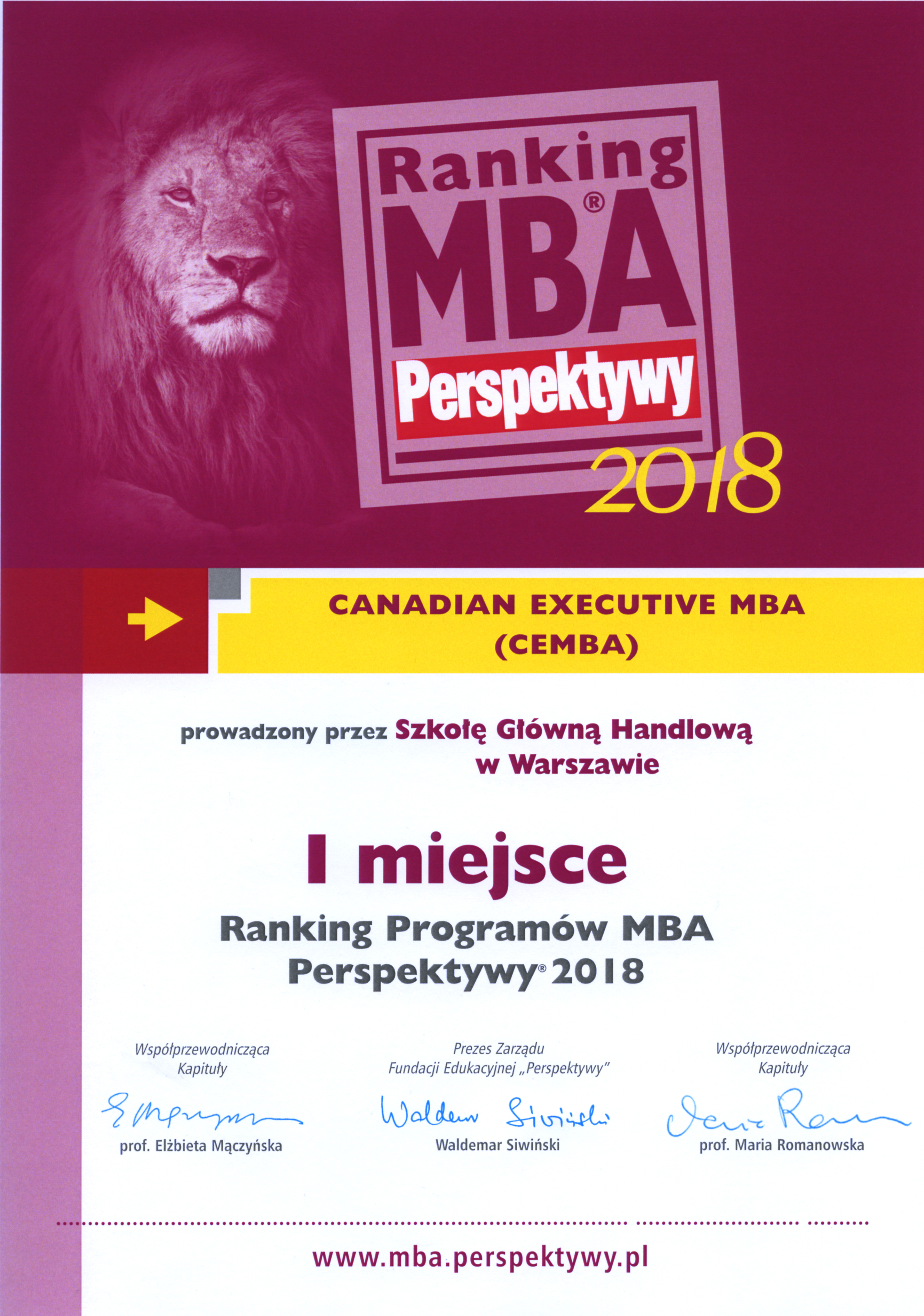
Ranking MBA Perspektywy 2015,
We are proud to announce that CEMBA Program has been ranked the best MBA program in Poland in the MBA Ranking PERSPEKTYWY 2015. Photos from the ceremony. More information.
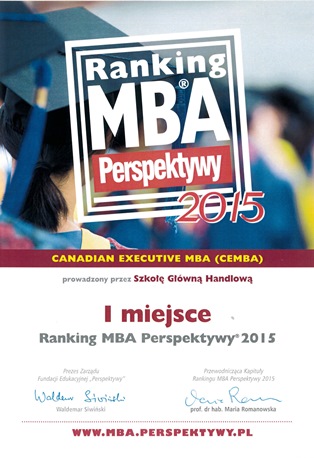
Puls Biznesu, 3th March 2011
Zachodni dyplom lepszy. Kryteria rankingów MBA read more
Wprost Magazine, 26th April 2005
The CEMBA office and professors are happy to announce that in the latest ranking by the magazine WPROST, the Canadian Executive MBA program at the Warsaw School of Economics was placed at the very top, together with the MBA program from the University of Illinois. The CEMBA program is continuously and relentlessly improving its performance as it was ranked number 2 in 2004 and number 3 in 2003. Thus, the Canadian Executive MBA program is fulfilling its mission to be among the very best MBA programs in Central and Eastern Europe.
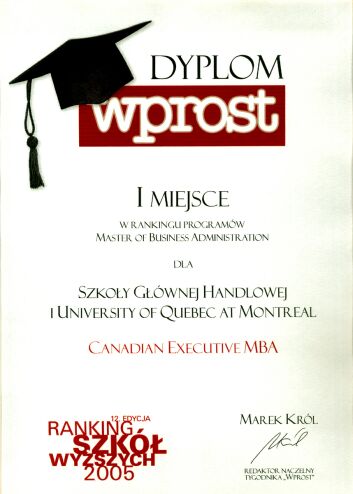
"Wprost" diploma for CEMBA Program
Gazeta Wyborcza, 30th March 2004
"Co się zmienia w MBA?"
MAGDALENA WÓJCIK: Czy programy studiów MBA zmieniają się w zależności od sytuacji w gospodarce światowej, np.kryzysu gospodarczego?
MONIKA STĘŻEWSKA, specjalistka ds. rekrutacji w Canadian Executive MBA przy SGH (CEMBA):Oczywiście, choć istnieje niezmienny zestaw przedmiotów wykładowych (tzw. core courses). Ale programy MBA dostosowują się do potrzeb gospodarki światowej. Np. w przededniu wejścia Polski do UE zmieniliśmy program studiów.
Czy po aferach związanych z kreatywną księgowością" w programie studiów MBA kładzie się większy nacisk na kwestie etyki?
-Tak. W ramach wielu programów MBA dodano zagadnienia związane z etyką, w niektórych nawet jako odrębny przedmiot.
Dlaczego studia MBA są tak drogie?
-Przede wszystkim dlatego, że ze względu na brak polskiego dyplomu MBA (i związanych z nim regulacji prawnych) uczelnie wyższe, które oferują takie studia, muszą nawiązać współpracę z uczelniami zagranicznymi. Pociąga to za sobą m.in. obowiązek zatrudniania zagranicznych profesorów. A dobry zagraniczny wykładowca zgodzi się przyjechac do Polski, jeśli dostanie bardzo atrakcyjne wynagrodzenie.
Czy warto robić MBA przez internet?
-Słyszałam, że istnieją programy MBA, które oferują nauczanie przez internet. Należy jednak zastanowić się, czy tego typu formy kształcenia nie odbierają uczestnikom dwóch najważniejszych wartości, tzn. kontaktu z wykładowcą oraz nawiązania znajomości (zarówno prywatnych, jak i biznesowych) z innymi studentami (tzw. networking).
Rzeczpospolita, 10th March 2004
"Szkoła Główna Handlowa w Warszawie od lat oferuje dwa programy studiów MBA: CEMBA, we współpracy z Uniwersytetem Quebec w Montrealu (Kanada), oraz WEMBA, we współpracy z University of Minnessota (USA).
-Rekrutację rozpoczęliśmy w marcu - mówi Monika Stężewska, specjalista ds rekrutacji na CEMBA. - Może ona zakończyć się w maju lub czerwcu, jak będziemy mieć 40 kandydatów. Każdy z nich przechodzi rozmowę kwalifikacyjną i zdaje egzamin językowy (chyba, że ma odpowiedni certyfikat). Wymagamy, aby kandydat miał minimum 4 lata doświadczenia zawodowego, najlepiej na kierowniczym stanowisku, bo zależy nam by wniósł własne doświadczenia do grupy, w której będzie studiował.
Profit March 2004, No.3.
In the Profit magazine from March 2004 the CEMBA program was recognized as one of the elite MBA programs on the Polish market.
"Nasze tegoroczne badanie kursów MBA potwierdziło, że polska elita to wciąż programy oferowane przez prestiżowe uczelnie warszawskie. Podobnie jak przed rokiem wyróżniamy dwa kursy, które są organizowane w Szkole Głównej Handlowej (WEMBA i CEMBA) (...).
One of the CEMBA graduates expressed his view about the program in the report devoted to Polish MBA market.
"Alistair Stevenson, Brytyjczyk zamieszkały w Polsce od 10 lat, ukończył studia CEMBA na SGH.
-Za (...) kurs zapłaciłem 3,5 tys. funtów, dziesięciokrotnie mniej niż w Wielkiej Brytanii. Grzechem byłoby nie skorzystać z takiej szansy - tłumaczy. Po zrobieniu dyplomu ówczesna pensja Alistaira skoczyła o 600%! MBA miało także wpływ na jego obecne stanowisko (od kilku miesięcy jest wiceprezesem wydawnictwa medycznego MedProGO) i kolejny skok wynagrodzenia".
The official results of the MBA Programs ranking were published in Wprost.
May 18th, 2003.
"CEMBA Programme was ranked by the WPROST magazine as one of the best three Executive MBA programs in Poland."
Our program successfully maintained its prestigious position among the most elite MBA studies in our country. The difference between the ratings of the ranking leader and CEMBA were equal to 2 points (on 1-100 point scale).
Puls Biznesu May 8th 2003, No.88.
"W czasie recesji firmy tną koszty, m.in. związane ze szkoleniem pracowników. Z drugiej jednak strony pracownicy chcą wyróżniać się wśród kolegów z pracy i dlatego rozpoczynają studia MBA - mówi Monika Stężewska z programu CEMBA."
BusinessWeek May 2003, No.5.
"...menedżerów do nauki motywują: trudna sytuacja na rynku pracy, konieczność zdobycia wiedzy, która pozwoli ich firmom na skuteczną walkę z konkurencją (...). Prezesi dużych firm przychodzą do CEMBA po wiedzę i dyplom MBA, bo często wiekszość ich podwładnych już go ma - zauważa Marek Gruszczyński (z programu CEMBA-przyp. aut.). Rośnie też liczba studiujących podyplomowo właścicieli firm rodzinnych."
Gazeta Wyborcza March 4th, 2003
Interview with CEMBA current student Mr. Michał Jeżewski from Avaya Sp. z o.o.:
"Recesja zachęca do podejmowania takich studiów. Rynek nie rozwija się tak szybko jak kiedyś, ma się więcej wolnego czasu, warto więc wykorzystać go na rozwijanie się, podnoszenie swoich kwalifikacji, aby w czasie tego zastoju gospodarczego samemu nie zardzewieć. Warto też uzbroić sie w dyplom MBA przed wejściem Polski do Unii Europejskiej. (...) I rzeczywiście widzę, że te studia dużo mi dają, i nie mam wątpliwości, że ta inwestycja mi się opłaci. Nie tylko finansowo. Dla mnie wiedza i umiejętności sa bardzo ważnym kapitałem."
Profit February 2003, No.23.
"Poprzestaliśmy w naszym Dossier na wskazaniu według nas w miarę równorzędnej szóstki najlepszych spośród 40 krajowych programów MBA. Są to: WEMBA i CEMBA przy SGH, IMBA i EMBA na Politechnice Warszawskiej, program MBA w Centrum Kształcenia Menedzerów a także EMBA - obydwa przy Wydziale Zarządzania Uniwersytetu Warszawskiego. Możemy je z czystym sumieniem polecić czytelnikom "Profitu"(...)."
